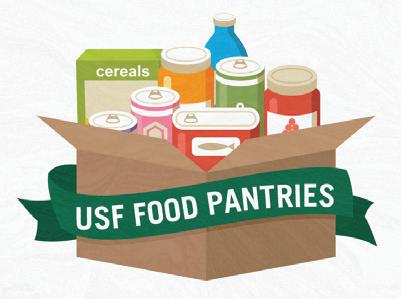
7 minute read
Reaching out
Calling all students: Sarasota-Manatee bridges the gap
WITH THE MID-SEMESTER SHIFT to remote instruction due to the coronavirus pandemic, staff at USF’s Sarasota-Manatee campus wanted to make sure students had the resources and support they needed to successfully continue their studies.
The nine staff members reached out by phone to students – all 2,100.
Brett Kemker, regional vice chancellor for academic and student affairs, says that when he learned that faculty and students were having difficulty connecting via email, he felt “the best thing our student success team could do was reach out to students personally by phone, just to check in and offer our support. The call-outs have been very well received.”
He related a conversation an academic program specialist had with a student enrolled in an online program.
“The student really appreciated the call, saying ‘I didn’t know if you knew I existed,’ since he already was fully online,“ Kemker says.
Megan Dudley, a sophomore majoring in interdisciplinary social sciences, says that in her time as a student at the Sarasota-Manatee campus, “I’ve never felt more connected to a school than when I received a call from Student Services.
“I was asked if I had any trouble adjusting and if they could be of assistance,” she says. “I was pleasantly surprised at the amount of concern they had for my academic success.”
Before the call was over, Dudley was able to schedule a phone appointment with a student advisor. “This call made me very appreciative of the amount of support from USF Sarasota-Manatee, and they could not have been more helpful at a time like this.”
Kemker looks forward to having his staff continue making the calls “even when we get back to normal.”
“It’s not a call saying ‘you need to do this or that,’ it’s just reaching out and making an honest connection,” he says.
- RICH SHOPES | Communications and Marketing
University students flock to Pen Pal program
AS UNIVERSITIES AROUND THE WORLD moved to remote teaching and learning during the spring semester, students from USF and universities around the world turned to a time-honored concept to stay connected: the pen pal. The College Pen Pal initiative was launched by the COMPASS student experience office at USF’s St. Petersburg campus after USF moved to remote instruction in March.
Less than 48 hours after the program was announced on Instagram, more than 700 students from universities across the country and all three USF campuses signed up to correspond with a like-minded pal while practicing social distancing.
By late April, the COMPASS office had matched nearly 1,600 students from 227 institutions, including 240 USF students. The vast majority are from the United States (including the University of Hawaii, Manoa), with additional sign-ups from Canada, Zambia and South Africa.
“I thought of the idea the first week students were away from campus, when we were scrambling to think through how to engage them from afar,” explains COMPASS Program Coordinator Meredith Mechanik. “My first thought was to keep the program within USF, but there’s something really powerful about the fact that college students around the world – regardless of their major or where they live – are having a shared experience. With that in mind, we leaned into the opportunity for them to connect with someone they likely never would’ve come across otherwise.”
To participate, students can go to bit.ly/collegepenpal. Links are also available on USF’s social media pages. After filling out the online form, participants will be matched with one another by members of the COMPASS program.
It is up to participants how frequently they want to correspond.
- CARRIE O’BRION | Marketing and Communications
USF RESPONDS: COVID-19
Food pantries respond to growing demand
AS THEY DID THROUGHOUT THE SPRING SEMESTER, food pantries on USF’s three campuses are continuing to help meet the needs of students. All three pantries have experienced high demand, indicating how the coronavirus pandemic and its impact on many sectors of the economy has directly affected students, from lost jobs to reduced family support due to changing financial situations.
Here’s a look at the three pantries:
Tampa campus
Stacey Struhar, MPH ’18, a registered dietitian with Student Health Services, says the Feed-A-Bull food pantry served nearly double the number of individuals who normally visit it during the spring semester. Feed-A-Bull was created in 2015 through a partnership between USF and Feeding Tampa Bay. Struhar says that although the pantry’s services are usually limited to students, under the current circumstances, it is open to faculty and staff who may be in need as well.
“As a registered dietitian, I recognize the importance of having enough food to eat, and how this can impact success in school or work,” Struhar says. “Through the pantry, we provide a variety of nutritious foods to those in need, which is especially important during these difficult times.”
Feed-A-Bull has experienced an outpouring of support. Through USF Dining, Aramark donated 650 pounds of fresh produce, baked goods, fruit juice, dairy products and protein. The pantry also received donations from local businesses, the USF Bookstore (Follett), a staff food drive and from individuals looking to help, but Struhar says the increased demand has led to the need for even more donations.
Students on campus and in off-campus housing may need support throughout the summer, says Susanna Perez-Field, ’94, Student Health Services’ communications and marketing officer. “We don’t know how long COVID-19 will impact businesses, and once businesses are operational, how long it may take students to be financially solvent again.”
The pantry is located in the Student Services breezeway, near the Office of Financial Aid and the ID Card Center. Donations are being accepted at that location during the pantry’s operating hours: Tuesday, 9 a.m.-noon; Wednesday, 1-4 p.m.; and Thursday, 3-5 p.m. If the donation is large, or help is needed with unloading, donors can pull up to the loading dock (take USF Willow Drive until it ends) and call the pantry at 813-974-5884.
For information about Feed-A-Bull’s services, or to learn more about how you can help, visit usf.edu/student-affairs/student-health-services/ services/feed-a-bull-food-pantry.aspx.

St. Petersburg campus
Between late March and mid-April, the Support-A-Bull Market distributed more than 500 pounds of food to a growing number of students.
That number almost equals the total amount of food the pantry had distributed since it opened last September, according to Joseph Contes, the assistant director of student outreach and support who manages the Support-A-Bull Market.
The pantry, which transitioned to online ordering to promote social distancing, provides food such as pasta, breads, fruit and vegetables. Hygiene products including soap and toothpaste are also provided to students. In addition, through a partnership with SPCA Tampa Bay, the pantry also provides food for dogs and cats. Support-A-Bull is available to all students enrolled at the USF St. Petersburg campus.
As the number of food orders grew, the pantry also saw an outpouring of donations from the community.
“We are tremendously thankful that when the demand increased for the services we provide here, our donors and their donations increased to match it,” Contes says.
The Support-A-Bull Market is a collaborative effort, with participation from multiple campus departments to keep it running. The pantry receives a monthly food donation from RCS Pinellas, and financial support from the university’s Town and Gown organization. To support the Support-A-Bull Market, food donations can be dropped off inside the University Police Department lobby, 530 3rd Street South. To learn more, visit usfsp.edu/student-outreach-and-support/food-pantry. Members of the community can also provide support by visiting giving.usf.edu/how/ herdfunder/support-bull-usf-st-petersburg.
Sarasota-Manatee campus
The campus’ Support-A-Bull Pantry opened at the end of March, relying on campus donations and the Sarasota-based All Faiths Food Bank, which provides non-perishable items.
The pantry, accessible to both students and their families, was created by Allison Dinsmore, assistant director of student success, Bart Stucker, coordinator of orientation and recreation programs, and the campus’ Food and Housing Insecurity Committee, comprised of students, faculty and staff.
“As members in our campus community experience challenges during these unprecedented times, basic essentials continue to be foremost on the minds of many students,” Dinsmore says. “The pantry is an opportunity to support our students holistically, so they can be successful academically.”
Students can shop for groceries through an online portal and then pick up their items at a discreet campus site. A worker distributes the items in plain packaging at a curbside location.
The pantry provides more than non-perishable food items as it broadens the support it offers to students.
“The one trend we’ve seen is that support is needed in other items besides food, such as soap, shampoo, diapers and baby wipes,” Dinsmore says.
To learn more, visit usfsm.edu/campus-life/support-a-bull-foodpantry.aspx.






